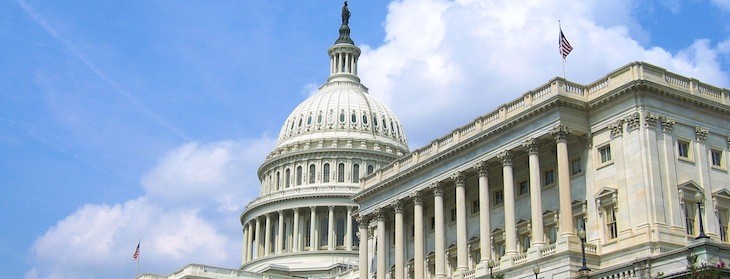U.S. House Budget Committee advances Obamacare repeal bill, tough path expected in Senate
by March 16, 2017 12:45 pm 328 views

The U.S. House Budget Committee on Thursday (March 16) advanced the American Health Care Act, with the two Arkansas members on the committee, U.S. Reps. Steve Womack and Bruce Westerman, voting yes.
The bill is the first of a multistep process to repeal and replace the Affordable Care Act (ACA), otherwise known as Obamacare. The vote was 19-17 on a committee with 22 Republicans and 14 Democrats. The bill, which was introduced March 6 and has already passed the Energy and Commerce and the Ways and Means Committees, now goes to the full House.
The bill would end the ACA’s mandate to buy health insurance and replace it with tax credits that would encourage Americans to purchase it. It would freeze the ACA’s expansion of Medicaid benefits in 2020 and introduce spending based on the amount of people on the program. There would be less money, but states would have more flexibility in spending it. It also prohibits funding to Planned Parenthood for one year.
The Congressional Budget Office and the Joint Committee on Taxation reported Monday that by 2026, about 52 million people would not have insurance if the AHCA passes, compared to 28 million who would not have it if the ACA continued – a difference of 24 million. The report said 14 million more Americans would be uninsured under the AHCA than under the ACA in 2018, most of them by choice because the act would repeal penalties for failing to have insurance. Later reductions in the insured population would come partly as a result of changes to Medicaid.
The report said the bill would reduce federal deficits by $337 billion over 2017-26, mostly by reducing spending for Medicaid and ending subsidies for nongroup health insurance.
Arkansas is one of 31 states that expanded its Medicaid population under the ACA, which it accomplished through what is now known as Arkansas Works, the program that uses federal Medicaid dollars to purchase private health insurance.
Referring to criticisms of Democrats that changes to Medicaid would hurt the most vulnerable, Westerman said, “Thanks to the Affordable Care Act, the destruction of Medicaid for those that need it most, the truly vulnerable, is already occurring.” He referred to one study by the Urban Institute saying that 82% of newly eligible Medicaid recipients under Obamacare would not have a child in the household, and 69% of those would be in the prime working ages of 19-44.
Westerman said increasing enrollment for able-bodied Americans has come at the expense of disabled ones, including one Arkansas family of a child born with a rare condition leading to multiple seizures a day. A Medicaid waiver, which the family is awaiting, would help pay for services, he said. He said governors should be able to use federal Medicaid dollars at their discretion.
“The discrepancy in the amount of funding between Medicaid expansion and traditional Medicaid is a gross injustice to the people that Medicaid was originally designed to protect – the elderly, the blind and the disabled,” he said.
Womack told Talk Business & Politics Wednesday that he is a “lean yes” on the bill. He expressed concerns about older Americans paying higher premiums.
“This whole plan may not be perfect,” he said. “There are some things that I think should be changed in it, notably and one of my chief concerns is what happens on the top income earners. That they get more of a break than the low income, particularly the low income senior – on not necessarily a fixed income, but a low income – we need to find the equilibrium somewhere there.”
Democrats sought but failed to attach amendments that would slow down the bill’s progress. They said its cuts in health care spending are really a tax cut in disguise, including for high-salaried CEOs of insurance companies. Their ranking member, Rep. John Yarmuth, D-Ky., said the bill would increase premiums, pricing older people out of insurance and creating a free market where none exists.
“This is Robin Hood in reverse, but far worse,” he said.
But Republicans pointed to rising premiums, higher taxes and fewer insurance providers under the Affordable Care Act, saying the AHCA would create more free market competition and reduce costs.
The bill faces a difficult future. Three Republicans on the committee joined with Democrats in voting no. U.S. Sen. Tom Cotton, R-Ark., said on ABC’s “This Week” Sunday that the bill cannot pass the Senate, asserting it would adversely affect millions of Americans and wouldn’t reduce the cost of health insurance. Meanwhile, it would put the House majority at risk.
“I would say to my friends in the House of Representatives, with whom I served, do not walk the plank and vote for a bill that cannot pass the Senate and then have to face the consequences of that vote,” he said.
U.S. Sen. John Boozman, R-Ark., told Talk Business & Politics in an interview broadcast Sunday that the process needs to slow down.
“The thing that’s so important is lowering the cost curve, making things affordable,” he said. “So many people in Arkansas have had their premiums doubled, so many are in situations with $5-10,000 deductibles. That’s not insurance. That’s catastrophic insurance and is really not acceptable.”
